

Revelations of Divine Love
2011 First Printing
Copyright 2011 by The Order of Julian of Norwich
ISBN: 978-1-55725-907-3
Library of Congress Cataloging-in-Publication Data
Julian, of Norwich, b. 1343.
Revelations of divine love / Julian of Norwich; introduced, translated, and ordered for daily devotional use by Father John-Julian.
p. cm. (Paraclete essentials)
Includes bibliographical references.
ISBN 978-1-55725-907-3
1. Devotional literature, English (Middle) 2. LoveReligious aspectsChristianityEarly works to 1800. 3. Private revelationsEarly works to 1800. 4. Julian, of Norwich, b. 1343. 5. MysticismEnglandHistoryMiddle Ages, 500500. I. Title.
BV4832.3.J86 2011
242.2dc22
2010048473
10 9 8 7 6 5 4 3 2 1
All rights reserved. No portion of this book may be reproduced, stored in an electronic retrieval system, or transmitted in any form or by any meanselectronic, mechanical, photocopying, recording, or any otherexcept for brief quotations in printed reviews, without the prior written permission of the publisher.
Published by Paraclete Press
Brewster, Massachusetts
www.paracletepress.com
Printed in the United States of America

CONTENTS

A LONELY SORT OF ACROBAT
NOTES BY THE TRANSLATOR

INTRODUCTION

I t is the prophetic Herbert ODriscoll who said, Julian is not only a great lady of the past; she is also a great woman in our future. And Thomas Merton himself wrote: Julian is without doubt one of the most wonderful of all Christian voices. She gets greater and greater in my eyes as I grow older and whereas in the old days I used to be crazy about St. John of the Cross, I would not exchange him now for Julian if you gave me the world and the Indies and all the Spanish mystics rolled up in one bundle.
What is it about this retiring, obscure, fourteenth-century English anchoress that stirs the hearts and minds of some of the greatest spiritual leaders of our time? What is it that has motivated dozens of books to be published about Julian in the last fifteen years (after almost six hundred years of silence)? What spark has she struck in the imaginations and in the souls of moderns that has brought her finally into the very forefront of contemporary spirituality?
There can be no doubt but that the answer is contained in the pages of this bookin her own account of the miraculous revelations granted her during her seemingly mortal illness, and her long-awaited and carefully considered understandings of the meaning and implication of those visions. And the answer cannot finally be given perfectly by anyone except Julian herself.
However, since our primary goal in this new translation of her work is to increase her accessibility to contemporary readers, it might be helpful for us to suggest some of the themes and patterns of thought and theology that spring from her insights and her understandings of this lesson of love she received from her Lord. We do not pretend to speak for Julianshe speaks too well for herselfbut we want here merely to point out some of Julians primary lines of thought so that readers may be sensitive to the uniqueness of her understandings and to their amazing relevance to our lives today.
OPTIMISM
First, and most obvious, Julian is a theological optimist. Standing over against the pessimism and sin-absorption of the popular theology of much of the Middle Agesand in spite of living in the midst of devastating cultural revolution and the collapse of centuries-old institutions and patterns of life on which whole cultures had been basedJulian stands forward astoundingly as a primary voice of hope.
When we think of the events during her life in England, the parallels with our own time present themselves with awesome clarity. She saw the assassination of a king and an archbishop, and the nationwide rioting of the poor in the Peasants Rebellion. She lived through three sieges of the Black Death, which struck Norwich with exceptional devastation and killed over half of the population there, saw the beginning of the Hundred Years War between England and France, and saw the firm rock of the papacy come crashing downfirst in the Babylonian Captivity at Avignon, and later in the Great Schism when for a time there were three men each claiming to be the true pope; she watched the continuing degeneration of the monasteries from being centers of the highest sacrifice and devotion to becoming Englands greatest (and most self-aggrandizing) landlords; she saw the results of the moral collapse of the Franciscan Friars (in whom so many had placed such high hopes); and she lived during the rise of Englands first heretics in the persons of Oxfords John Wycliff and his later Lollard followers (some of whom were executed in the Lollards Pit in Mousehold Heath at the edge of Norwich).
This was the mad, crumbling world in which this exceptional woman lived, and it was in this world that, astoundingly, she was able to accept and articulate those most famous words: All shall be well, and all shall be well, and all manner of thing shall be well.
TRANSCENDENCE OF HISTORY
Can you imagine a twenty-first-century spiritual writer who made no comment on current social events? And yet there is not a single specific mention of any of her worlds turmoil in Julians writings! The reason is what we would describe as Julians transcendence of events. Any specific historical occurrence is of relative unimportance to one who does not worry and has no anxiety about those events!
Julians transcendence is not a repudiation of pain, suffering, and turmoil (for we see even in the examples she uses that she knows those things well), but it is a passing beyond those earthly things, a refusal to be trapped by them, in the unswerving quiet confidence that truly He does and causes every thing that is done. There is, for Julian, no need to maunder and moan about circumstances and historical events, because whatever those circumstances or whatever those events, they are there at the will of God and in the hand of God, and our heavenly Mother Jesus cannot allow us that are His children to perish.
Indeed, she shows her assurance that her Lord will give us more light and solace in heavenly joy by drawing our hearts from the sorrow and darkness which we are in. In her long parable of the lord and the servant, Julian recognizes that one of the pains suffered by the fallen servant is that he is blinded by his own trouble and pain to such a degree that he cannot see the loving face of his lord as it looks upon him. And Julian would struggle to avoid the same myopia of allowing herself to become blinded by the events of her day. In the context of the permanent and unflagging love of God, and absolute confidence in His will, Julian need not lose sight of the eternal forest for the circumstantial trees.
NO WRATH IN GOD
Julians uncompromising proposition that our Lord was never angry, nor ever shall be speaks wonderfully to the guilt-ridden, parent-transferring Christian of today. Julian is blatant (almost a little short with potential opponents): He cannot be angry. It would be impossible. For Julian, God is never a judgmental Daddy-writ-large! And with a psychological acumen far in advance of her time, she declares that the reason we tend to see wrath in God is that the wrath is in us, and that in our own blindness, we project and attribute our wrath to God.

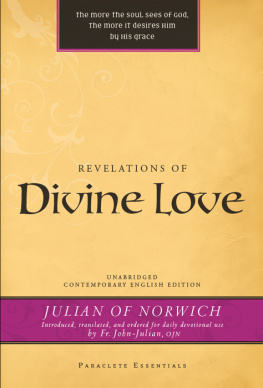
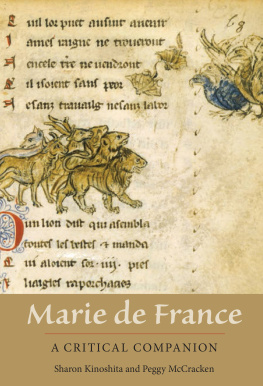




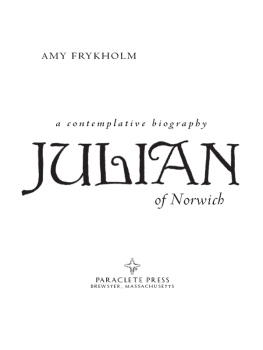
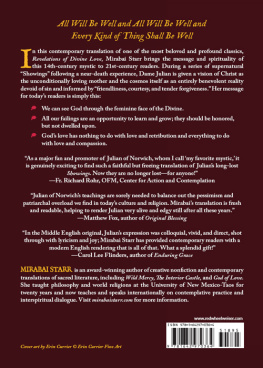


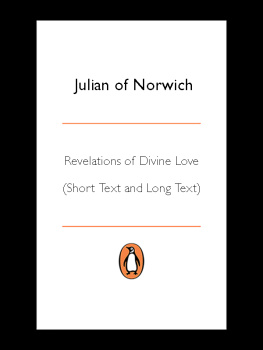


 CONTENTS
CONTENTS